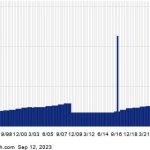By Leika Kihara and Yoshifumi Takemoto
TOKYO (Reuters) -Japan’s economy grew less than initially estimated in the second quarter and wages slumped in July, casting doubt over central bank projections that solid domestic demand will keep the country on course for a recovery.
Capital expenditure and private consumption both fell in the April-June period, revised gross domestic product (GDP) data showed on Friday, underscoring the fragile state of Japan’s economy, which is already facing headwinds from weakening Chinese and U.S. growth.
Real wages adjusted for inflation fell in July for a 16th straight month in a sign households continued to feel the pinch from rising prices, separate data showed, boding ill for consumption.
“Weak exports to China may be making Japanese manufacturers cautious about investing. The hope is that service-sector firms will pick up the slack, though sluggish consumption could discourage them to spend money, too,” said Takeshi Minami, chief economist at Norinchukin Research Institute.
Japan’s economy grew an annualised 4.8% in April-June, the revised data showed, down from a preliminary estimate of 6.0% growth and below market forecasts for a revised 5.5% expansion.
The main factor behind the downgrade was a 1.0% drop in capital expenditure, compared with a preliminary flat reading, casting doubt on the BOJ’s view that robust corporate spending will underpin Japan’s post-pandemic economy. The revised decline was bigger than a median market forecast for a 0.7% fall.
Private consumption, which makes up more than half of the economy, fell 0.6% quarter-on-quarter in the April-June period, compared with a preliminary 0.5% decline.
Exports remained solid in April-June with net external demand contributing 1.8% points to GDP growth, unchanged from the preliminary reading.
But shipments to China slumped 13.4% in July to mark the 8th straight month of falls. Overall exports slid 5.0% year-on-year in the first half of August after a 0.3% decline in July, suggesting the global slowdown was taking a toll on the economy.
As weak domestic demand led to declines in imports, Japan’s current account surplus logged a record amount for the month of July, separate data released on Friday showed.
“I won’t be surprised if Japan suffers two straight quarters of contraction during the rest of this year,” said Minami of Norinchukin. “The chance of an early end to ultra-loose monetary policy is diminishing.”
Japan’s economy has seen a delayed recovery from the COVID-19 pandemic this year, as rising living costs faltering global demand cloud the outlook.
Given such uncertainties, Bank of Japan policymakers have stressed their resolve to keep monetary policy ultra-loose until the recent cost-driven inflation turns into price rises driven by domestic demand and higher wage growth.
Read the full article here




